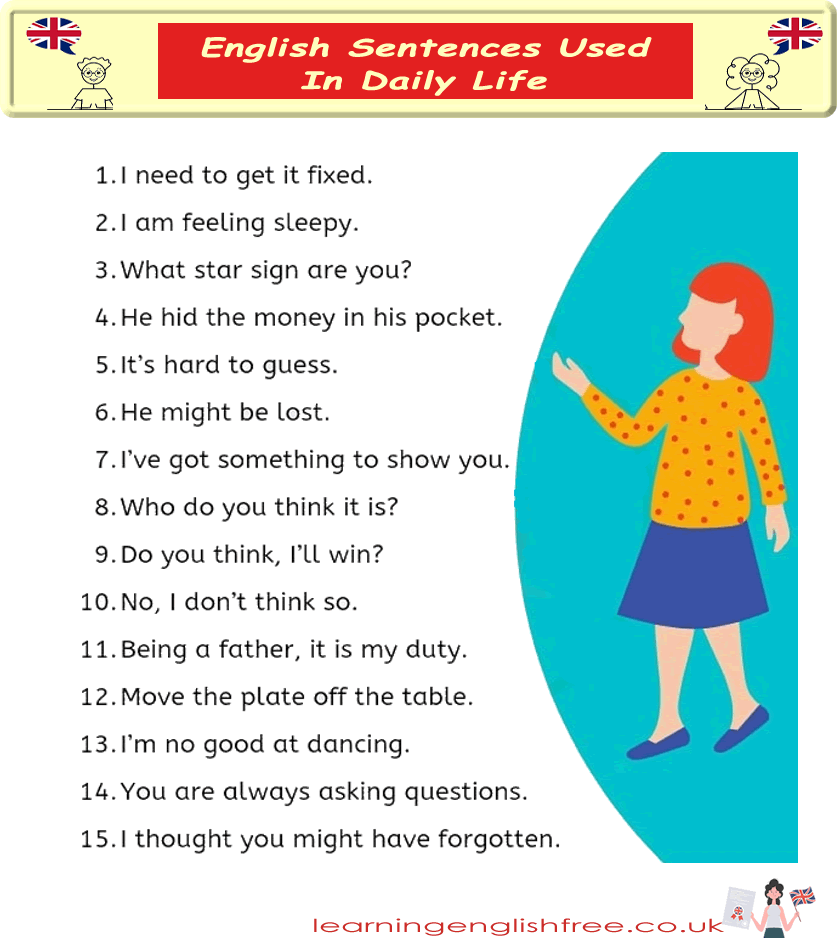
Essential English Sentences for Daily Conversations
Navigating daily conversations in English can be a daunting task for ESL learners. The language's vast vocabulary and complex grammar rules often leave students feeling overwhelmed. However, mastering a set of essential sentences can significantly ease this burden, making everyday interactions more manageable and less intimidating. This lesson aims to equip learners with common English sentences used in daily life, providing a solid foundation for effective communication.
By understanding and practising these sentences, learners will be able to express needs, share thoughts, ask questions, and engage in basic conversations with confidence. This guide not only lists these sentences but also explains their meanings and contexts, ensuring that students can use them appropriately in various situations. Whether you're asking about someone's well-being, making a request, or expressing an opinion, these sentences will come in handy.
Useful Vocabulary for Daily English Conversations
Before diving into the examples, let's highlight some key phrases that frequently appear in daily English conversations:
- Get it fixed: To have something repaired.
- Feeling sleepy: Experiencing tiredness or a desire to sleep.
- Star sign: A sign of the zodiac that people belong to, based on their birth date.
Understanding these phrases will enhance your ability to use the sentences effectively in your daily interactions.
English Sentences Used In Daily Life
-
I need to get it fixed.
- Meaning: There's something that requires repair.
- Example: "My phone stopped working; I need to get it fixed."
-
I am feeling sleepy.
- Meaning: Feeling the need to sleep.
- Example: "After that long meeting, I am feeling sleepy."
-
What star sign are you?
- Meaning: Asking about someone's zodiac sign.
- Example: "You're so adventurous! What star sign are you?"
-
He hid the money in his pocket.
- Meaning: He concealed the money by placing it in his pocket.
- Example: "He didn't want to spend more, so he hid the money in his pocket."
-
It's hard to guess.
- Meaning: It's difficult to predict or determine.
- Example: "Without all the facts, it's hard to guess the outcome."
-
He might be lost.
- Meaning: There's a possibility that he has lost his way.
- Example: "He's been gone for hours; he might be lost."
-
I've got something to show you.
- Meaning: There's something the speaker wants to reveal or display.
- Example: "Come here, I've got something to show you!"
-
Who do you think it is?
- Meaning: Asking for an opinion on the identity of someone or something.
- Example: "There's someone at the door. Who do you think it is?"
-
Do you think I'll win?
- Meaning: Asking for someone's opinion on the likelihood of winning.
- Example: "I'm nervous about the competition. Do you think I'll win?"
-
No, I don't think so.
- Meaning: Expressing disagreement or doubt about a previous statement.
- Example: "Will it rain today? No, I don't think so."
-
Being a father, it is my duty.
- Meaning: Expressing responsibility associated with the role of a father.
- Example: "Being a father, it is my duty to protect my children."
-
Move the plate off the table.
- Meaning: Requesting someone to remove the plate from the table.
- Example: "We need to clear the table. Could you move the plate off the table?"
-
I'm no good at dancing.
- Meaning: Admitting a lack of skill in dancing.
- Example: "I'd rather not join the dance floor; I'm no good at dancing."
-
You are always asking questions.
- Meaning: Observing that someone frequently asks questions.
- Example: "You are always asking questions, which is great for learning."
-
I thought you might have forgotten.
- Meaning: Assuming that someone may have forgotten something.
- Example: "You remembered my birthday! I thought you might have forgotten."
Summary and Takeaways
Mastering everyday English sentences is a crucial step toward fluency. This lesson has introduced fifteen essential sentences, along with their meanings and examples, to help ESL learners navigate daily conversations more effectively. By incorporating these sentences into your spoken English, you'll find it easier to express a wide range of thoughts and feelings, ask questions, and interact with others.
To solidify your understanding, try creating your own examples with each sentence. Practice using them in real-life situations, whether speaking with friends, practising in language learning apps, or writing them down in a journal. Additionally, consider recording yourself speaking these sentences to improve your pronunciation and gain confidence in your speaking abilities.
Remember, consistency is key. Regular practice and application of these sentences in your daily life will enhance your communication skills and build your English vocabulary. Share your learning journey with others and don't hesitate to seek feedback.
For more tips, lessons, and language learning support, visit our Facebook page Learning English Free. Join our community to connect with fellow learners and access a wealth of resources to aid your English learning journey.
